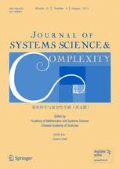Abstract
The effects of measurement noise are investigated in the context of bipartite consensus of multi-agent systems. In the system setting, discrete-time double-integrator dynamics are assumed for the agent, and measurement noise is present for the agent receiving the state information from its neighbors. Time-varying stochastic bipartite consensus protocols are designed in order to lessen the harmful effects of the noise. Consequently, the state transition matrix of the closed-loop system is analyzed, and sufficient and necessary conditions for the proposed protocol to be a mean square bipartite consensus protocol are given with the help of linear transformation and algebraic graph theory. It is proven that the signed digraph to be structurally balanced and having a spanning tree are the weakest communication assumptions for ensuring bipartite consensus. In particular, the proposed protocol is a mean square bipartite average consensus one if the signed digraph is also weight balanced.
Similar content being viewed by others
References
Olfati-Saber R and Murray R M, Consensus problems in networks of agents with switching topology and time-delays, IEEE Trans. Automatic Control, 2004, 49(9): 1520–1533.
Ren W and Beard R M, Consensus seeking in multiagent systems under dynamically changing interaction topologies, IEEE Trans. Automatic Control, 2005, 50(5): 655–661.
Ma C Q and Zhang J F, Necessary and sufficient conditions for consensusability of linear multiagent systems, IEEE Trans. Automatic Control, 2010, 55(5): 1263–1268.
Ma C Q and Zhang J F, On formability of linear continuous-time multi-agent systems, Journal of Systems Science & Complexity, 2012, 25(1): 13–29.
Sun W, Wang Y, and Yang R, L2 disturbance attenuation for a class of time delay Hamiltonian systems, Journal of Systems Science & Complexity, 2011, 24(4): 672–682.
Wang B C and Zhang J F, Distributed control of large population multiagent systems with random parameters and a major agent, Automatica, 2012, 48(9): 2093–2106.
Aronson E, Wilson T, and Akert R, Social Psychology, Prentice Hall, Upper Saddle River, N. J., 2010.
Easley D and Kleinberg J, Networks, Crowds, and Markets, Reasoning About a Highly Connected World, Cambridge University Press, Cambridge, 2010.
Kim C M, Rim S, Kye W H, et al., Antisynchronization of chaotic oscillators, Phys. Lett. A, 2003, 320(1): 39–46.
Altafini C, Consensus problems on networks with antagonistic interactions, IEEE Trans. Automatic Control, 2013, 58(4): 935–946.
Hu J and Zheng W X, Emergent collective behaviors on coopetition networks, Phys. Lett. A, 2014, 378(26–27): 1787–1796.
Zhang H and Chen J, Bipartite consensus of general linear multi-agent systems, Proc. Amer. Control Conf., Portland, Oregon, USA, June 4–6, 2014.
Valcher M E and Misra P, On the consensus and bipartite consensus in high-order multi-agent dynamical systems with antagonistic interactions, Syst. Control Lett., 2014, 66(4): 94–103.
Proskurnikov A V, Matveev A, and Cao M, Opinion dynamics in social networks with hostile camps: Consensus vs. polarization, IEEE Trans. Automatic Control, 2016, 61(6): 1524–1536.
Huang M and Manton J H, Coordination and consensus of networked agents with noisy measurements: Stochastic algorithms and asymptotic behavior, SIAM J. Control Optim., 2009, 48(1): 134–161.
Li T and Zhang J F, Mean square average consensus under measurement noises and fixed topologies: Necessary and sufficient conditions, Automatica, 2009, 45(8): 1929–1936.
Ma C, Li T, and Zhang J F, Consensus control for leader-following multi-agent systems with measurement noises, Journal of Systems Science & Complexity, 2010, 23(1): 35–49.
Liu S, Xie L, and Zhang H, Distributed consensus for multiagent systems with delays and noises in transmission channels, Automatica, 2011, 47(5): 920–934.
Gao L, Wang D, and Wang G, Further results on exponential stability for impulsive switched nonlinear time delay systems with delayed impulse effects, Applied Mathematics and Computation, 2015, 268: 186–200.
Cheng L, Hou Z G, Tan M, et al., Necessary and sufficient conditions for consensus of doubleintegrator multi-agent systems with measurement noises, IEEE Trans. Automatic Control, 2011, 56(8): 1958–1963.
Cheng L, Wang Y P, Hou Z G, et al., Sampled-data based average consensus of second-order integral multi-agent systems: Switching topologies and communication noises, Automatica, 2013, 49(5): 1458–1464.
Wang Y, Cheng L, Hou Z G, et al., Consensus seeking in a network of discrete-time linear agents with communication noises, Int. J. Syst. Science, 2015, 46(10): 1874–1888.
Ma C Q and Qin Z Y, Bipartite consensus on networks of agents with antagonistic interactions and measurement noises, IET Control Theory Appl., 2016, 10(17): 2306–2313.
Ma C Q, Qin Z Y, and Zhao Y B, Bipartite consensus of integrator multi-agent systems with measurement noise, IET Control Theory Appl., 2017, 11(18): 3313–3320.
Ma C Q, ZhaoW W, and Zhao Y B, Bipartite linear χ-consensus of double-integrator multi-agent systems with measurement noise, Asian Journal of Control, 2018, 20(2): 1–8.
Xie G M and Wang L, Consensus control for a class of networks of dynamic agents, Int. J. Robust Nonlin. Control, 2007, 17(10–11): 941–959.
Meng D, Du M, and Jia Y, Interval bipartite consensus of networked agents associated with signed digraphs, IEEE Trans. Automatic Control, 2016, 61(12): 3755–3770.
Cheng L, Wang Y, Hou Z G, et al., Convergence rate of leader-following consensus of networks of discrete-time linear agents in noisy environments, Proceedings of the 35th Chinese Control Conference, Chengdu, China, July 2016.
Chow Y S and Teicher H, Probability Theory: Independence, Interchangeability, Martingales, 3rd Ed., Springer-Verlag, New York, 1997.
Author information
Authors and Affiliations
Corresponding author
Additional information
This research was supported by the National Natural Science Foundation of China under Grant Nos. 61104136, 61673350, 61573228, the Natural Science Foundation of Shandong Province under Grant Nos. ZR2010FQ002, ZR2016FQ09, Postgraduate Education Innovation Program of Shandong Province under Grant No. SDYY16088, and the Young Teacher Capability Enhancement Program for Overseas Study, Qufu Normal University.
This paper was recommended for publication by Editor SUN Jian.
Rights and permissions
About this article
Cite this article
Ma, C., Zhao, W. & Zhao, Y. Bipartite Consensus of Discrete-Time Double-Integrator Multi-Agent Systems with Measurement Noise. J Syst Sci Complex 31, 1525–1540 (2018). https://doi.org/10.1007/s11424-018-7363-x
Received:
Revised:
Published:
Issue Date:
DOI: https://doi.org/10.1007/s11424-018-7363-x




